After a reported one-week pause, the Dangote Petroleum Refinery has recommenced truck-loading and the sale of Premium Motor Spirit (PMS). This return to the market, which began in the first week of August 2025 and was reflected in downstream allocations on the Thursday of that week, has helped alleviate recent uncertainty in the distribution chain. The ex-depot (gantry) price has been set at ₦850 per litre.
The refinery’s new gantry price has increased by ₦30 per litre, reaching ₦850 from the previous ₦820. This 3.66% increase, while seemingly small, is significant given the tight margins in the market. Downstream actors face pressure from factors like freight and foreign-exchange effects, making it difficult to absorb costs without passing them on to consumers.
What happened operationally
An internal operational decision led to a temporary freeze in payments to the refinery’s PMS collection account. This prompted marketers to halt gantry payments until clarification was provided. An advisory circulated in market channels and reported by local energy press confirmed this, causing a brief suspension of loading at the refinery’s gantry and a short interruption of deliveries to some marketers. Within the following week, loading activities resumed at the 650,000 barrels-per-day complex, located in the Lekki Free Trade Zone, which is central to Nigeria’s downstream industry restructuring.
While Dangote’s corporate communications moved to dispel rumors of a complete shutdown, attributing intermittent activity to routine commercial adjustments and specific tenders for large product parcels, the episode nevertheless created a short-term risk premium. Independent marketers and traders, fearing a prolonged interruption and subsequent retail supply squeeze, were particularly affected. The company reassured the market that operations were ongoing.
Why the gantry price matters
The core element of the retail pump price is the ex-depot (gantry) price, which is determined by the landing cost, distribution, and wholesale margins. In Nigeria, the landing cost significantly impacts this, influenced by crude and refined product prices, transport costs, and the naira-dollar exchange rate. Additionally, statutory and commercial distribution allowances play a role. Consequently, even small changes at the gantry, particularly those stemming from exchange rate fluctuations or international crude price volatility that increase landing costs, directly affect pump prices.
The global link: crude sourcing and price transmission
Energy analysts believe the recent gantry adjustment was primarily caused by the inherent instability of global crude and product markets. The Dangote refinery, since its inception, has processed both local and imported crude oil. Due to limitations in domestic deliveries under the government’s naira-for-crude agreements, the refinery has significantly relied on imported barrels, including U.S. WTI shipments. This dependence on the international physical crude market means that fluctuations in benchmark prices, freight costs, and the dollar’s value against crude can rapidly impact the refinery’s landing cost calculations.
Market dynamics and the policy frame
Two immediate consequences emerge. Firstly, petrol stations and marketers will decide whether to absorb the additional cost or increase pump prices. Historically, and in recent pricing trends, it’s likely that a significant portion of this increase will be passed on to consumers. Secondly, this situation highlights Nigeria’s downstream sector’s susceptibility to currency fluctuations and crude oil sourcing policies. When domestic crude allocations are insufficient, and refineries must import feedstock priced in dollars, both buyers and regulators become vulnerable to international price volatility. The most direct ways to mitigate repeated volatility are through policy interventions, such as enforcing domestic crude supply obligations and implementing clearer, more predictable pricing frameworks.
Immediate update and outlook
The refinery recently adjusted its gantry price, reducing it from ₦850 to ₦820 per liter, effective August 12, 2025. This rapid change highlights the dynamic nature of gantry pricing, which can shift quickly in response to market information and internal business decisions. It is anticipated that similar short, sharp pricing fluctuations will continue until crude supply channels stabilise and the calculation of landing costs becomes more consistent.
This serves as a concise illustration of how refinery commercial policy, crude sourcing strategy, and delicate distribution mechanisms collectively influence gasoline prices at the pump. It underscores the necessity of transparent and enforceable crude allocation and pricing regulations to consistently translate the benefits of local refining into lower, more stable end-user prices.
By Sesona Mdlokovana
Associate at The BRICS+ Consulting Group
African Specialist
** MORE ARTICLES ON OUR WEBSITE https://bricscg.com/ (https://bricscg.com/)
** Follow https://x.com/brics_daily (https://x.com/brics_daily) on X/Twitter for daily BRICS+ updates

